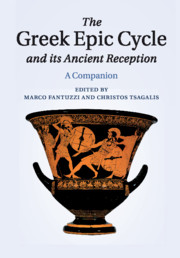Book contents
- Frontmatter
- Contents
- List of illustrations
- List of contributors
- Editorial note
- Introduction: Kyklos, the Epic Cycle and Cyclic poetry
- PART I APPROACHES TO THE EPIC CYCLE
- 1 Coming adrift: The limits of reconstruction of the cyclic poems
- 2 Oral traditions, written texts, and questions of authorship
- 3 The Epic Cycle and oral tradition
- 4 The formation of the Epic Cycle
- 5 Motif and source research: Neoanalysis, Homer, and Cyclic epic
- 6 Meta-Cyclic epic and Homeric poetry
- 7 Language and meter of the Epic Cycle
- 8 Narrative techniques in the Epic Cycle
- 9 Wit and irony in the Epic Cycle
- 10 The Trojan War in early Greek art
- PART II EPICS
- PART III THE FORTUNE OF THE EPIC CYCLE IN THE ANCIENT WORLD
- Works cited
- Index of principal passages
- Index nominum et rerum
4 - The formation of the Epic Cycle
from PART I - APPROACHES TO THE EPIC CYCLE
Published online by Cambridge University Press: 05 August 2015
- Frontmatter
- Contents
- List of illustrations
- List of contributors
- Editorial note
- Introduction: Kyklos, the Epic Cycle and Cyclic poetry
- PART I APPROACHES TO THE EPIC CYCLE
- 1 Coming adrift: The limits of reconstruction of the cyclic poems
- 2 Oral traditions, written texts, and questions of authorship
- 3 The Epic Cycle and oral tradition
- 4 The formation of the Epic Cycle
- 5 Motif and source research: Neoanalysis, Homer, and Cyclic epic
- 6 Meta-Cyclic epic and Homeric poetry
- 7 Language and meter of the Epic Cycle
- 8 Narrative techniques in the Epic Cycle
- 9 Wit and irony in the Epic Cycle
- 10 The Trojan War in early Greek art
- PART II EPICS
- PART III THE FORTUNE OF THE EPIC CYCLE IN THE ANCIENT WORLD
- Works cited
- Index of principal passages
- Index nominum et rerum
Summary
The question of how the Epic Cycle was formed may be treated as a threefold one. Firstly, at what stage of the epic tradition did poems covering those areas of mythology first appear? Secondly, when and by what stages did a sense develop that a sequence of such poems, taken together, told a continuous story, so that if there was a gap a new poem might be composed to fill it? Thirdly, when and how did an Epic Cycle come to be formally recognized as a larger whole, and what was its literary or bibliographical status?
The subject range of pre-Homeric epic
It is generally accepted that the history of Greek epic reaches back into the Mycenaean period. Poems about a Trojan War perhaps began to be composed in the twelfth century. The legend of the Argo's voyage may have been the subject of song at the same period or not much later. There must have been many other strands of heroic poetry embodying and embellishing local memories of past events. After the middle of the eighth century, when Ionian epic evidently enjoyed a great flowering, we begin to have a clearer sense of some of the themes that were then current among epic singers. For example, from a series of allusions in Hesiod's Theogony it can be inferred that there were various songs about the deeds of Heracles, though perhaps no comprehensive Heraclea covering his whole career. Each of these songs had an independent existence. They did not have to be recited or heard together or in a particular order. But they could be said to have constituted a Heracles cycle, in the loose sense in which scholars sometimes speak of a Sumerian Bilgames cycle or a Hurrian–Hittite Kumarbi cycle: that is, a set of poems attached to a particular figure, but not (so far as we know) intended to be taken in a particular order or perceived as forming a larger whole.
In the same way there must have been a set of poems relating to Thebes, and another relating to Troy. So long as epic remained purely oral their contents were in flux, continually evolving, but each established theme had an identity that persisted through the changing performances.
- Type
- Chapter
- Information
- The Greek Epic Cycle and its Ancient ReceptionA Companion, pp. 96 - 107Publisher: Cambridge University PressPrint publication year: 2015
- 1
- Cited by



